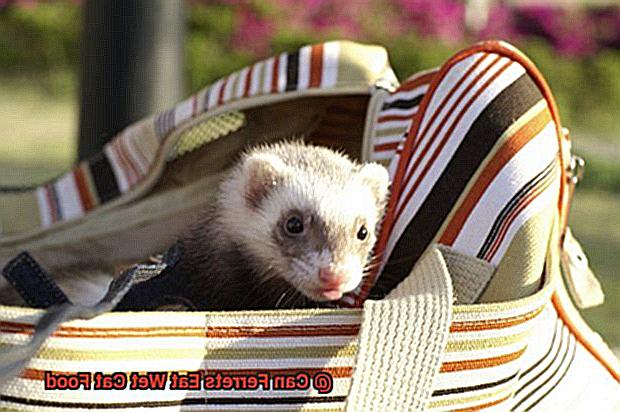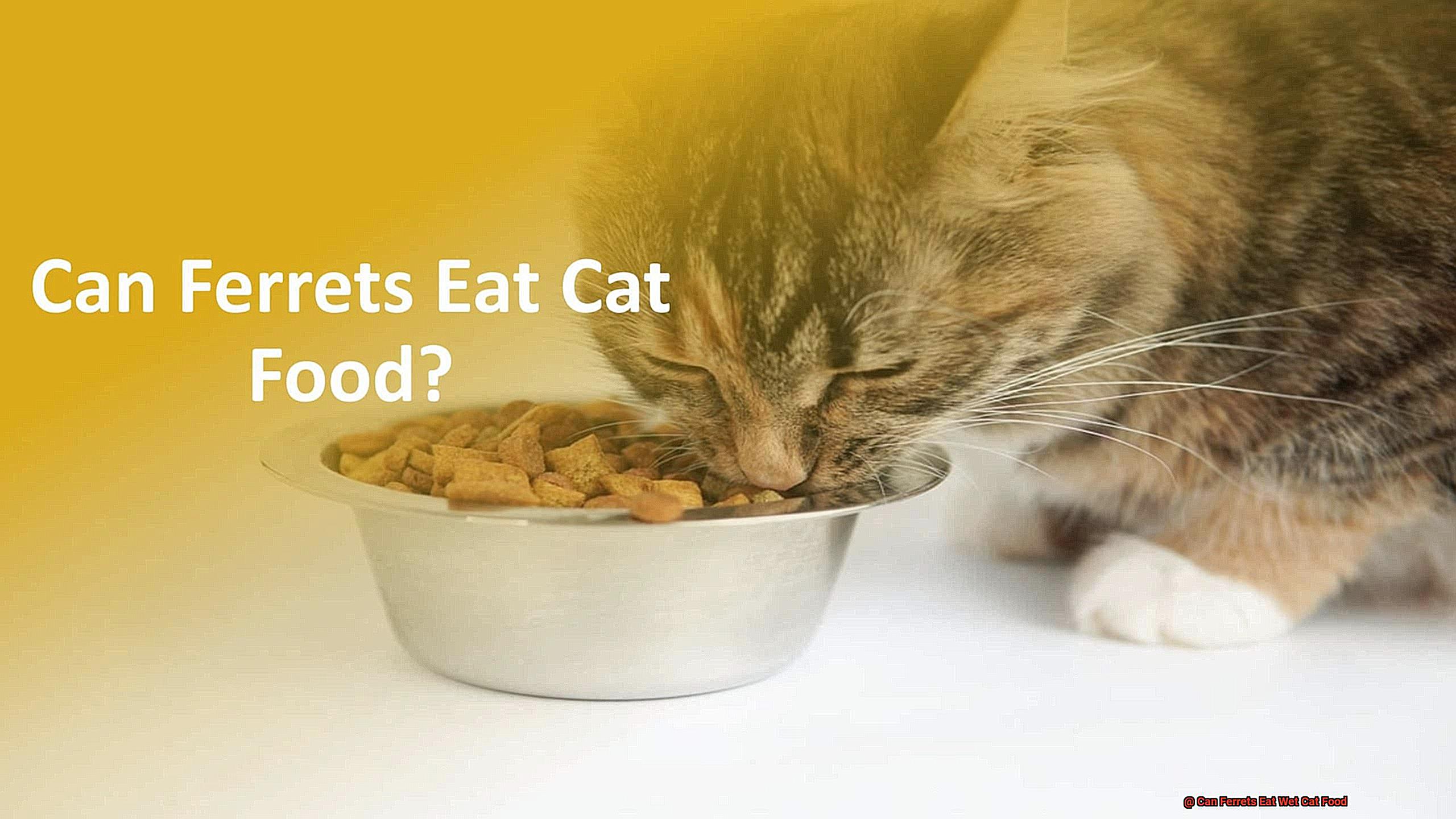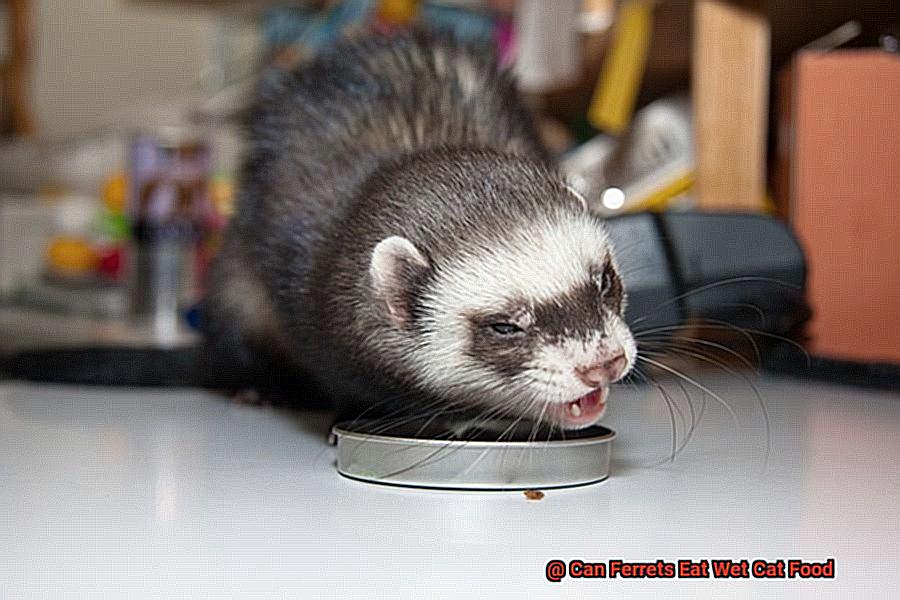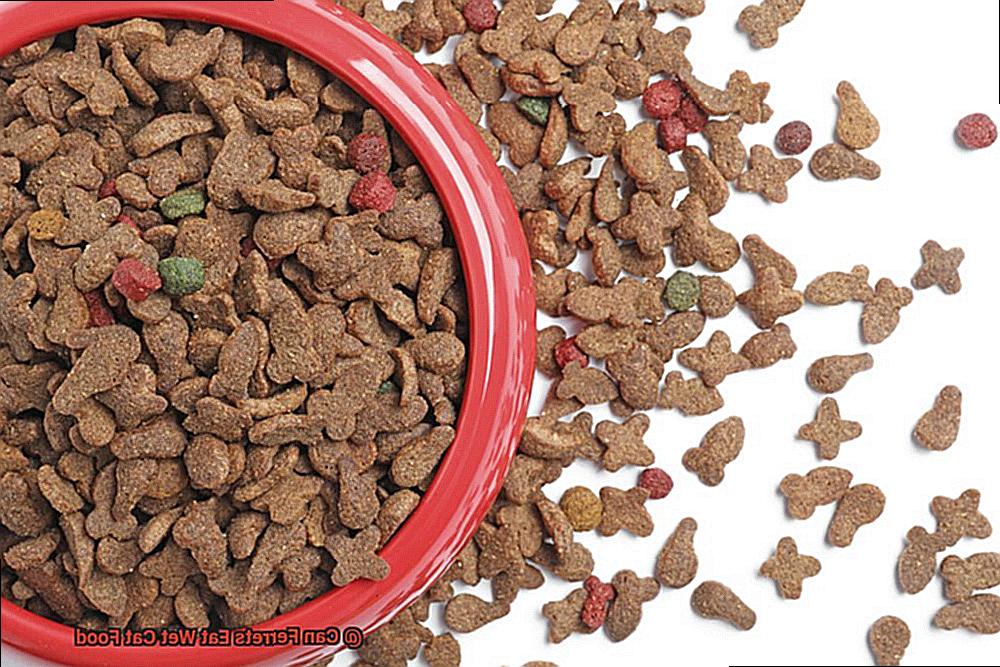Do you have a furry little ferret that you adore but are unsure about what to feed them? These unique creatures require a special diet to stay healthy, and as their owner, it’s your responsibility to provide them with the best possible nutrition. If you’re looking for a new food option to switch up your ferret’s meals, you may be wondering if wet cat food is a viable option.
While wet cat food is made almost entirely of animal protein, which ferrets need in high quantities, there are some important factors to consider before feeding it to your pet. Ferrets have specific nutrient requirements that aren’t always present in wet cat food. For example, they require a high amount of fat in their diets and thrive on a balanced mix of protein, fat and minerals. Without these essential nutrients, ferrets can develop health problems such as skin issues, digestion problems and even anemia.
In this blog post, we’ll explore the benefits and drawbacks of feeding your ferret wet cat food. We’ll also provide tips on how to ensure their diet is complete and balanced so that they can live long and healthy lives. So grab a snack and let’s dive into the world of ferret nutrition.
What Do Ferrets Eat?
If so, you may be wondering what types of food are best to keep your furry friend healthy and happy. As obligate carnivores, ferrets require a diet that is high in protein and fat to thrive. Therefore, feeding them the right foods is essential to their wellbeing.

The majority of a ferret’s diet should consist of high-quality commercial ferret food that is specifically formulated for their nutritional needs. These foods are available in both dry kibble and wet food varieties and contain all the essential nutrients that ferrets need to stay healthy. Wet cat food is also a popular choice among ferret owners as it contains meat protein and moisture that can help keep their pets hydrated.
However, not all wet cat food brands are suitable for ferrets. Before feeding your furry friend wet cat food, it’s important to check the label for ingredients. The first ingredient should be a named meat source, such as chicken or turkey. Avoid cat foods that contain fillers like corn and soy, as these provide little nutritional value for ferrets.

Harmful additives or preservatives could also be present in wet cat food. Onion and garlic powder are often added to cat food for flavor, but they can cause anemia in ferrets. Similarly, artificial sweeteners like xylitol can be toxic to ferrets.
In addition to commercial ferret food and wet cat food, ferrets can also be fed small amounts of cooked eggs, chicken, turkey, and other lean meats. However, it’s important to avoid giving them any sugary or starchy foods such as fruits, vegetables or grains as these can cause digestive problems and lead to obesity.
To ensure that your ferret is getting a balanced diet, you should consider supplementing their wet cat food with other sources of protein. You can also offer your ferret small amounts of fruits and vegetables as treats, but these should not make up a significant portion of their diet.
Is Wet Cat Food Suitable for Ferrets?
Ferrets and cats are both obligate carnivores, meaning they require a high protein diet to maintain optimal health. Fortunately, most wet cat foods do contain a high percentage of protein, which is excellent news for ferrets. However, it’s worth noting that some wet cat foods may contain ingredients that are not suitable for ferrets, such as grains or vegetables. Ferrets have a short digestive tract and cannot break down these types of ingredients efficiently, which can cause digestive issues.
One of the main concerns with feeding wet cat food to ferrets is its high moisture content. Ferrets need a diet that is high in protein and fat but low in carbohydrates and water. Too much moisture in their diet can lead to diarrhea and dehydration, particularly if your ferret has a history of urinary tract problems.

Additionally, many wet cat foods contain added vitamins and minerals that are not necessary for ferrets. This can result in an imbalance in their diet and potentially harm their health. Therefore, it’s critical to select a brand that is specifically formulated for ferrets or consult with a veterinarian before introducing it into their diet.
What to Look for in Wet Cat Food for Ferrets
When it comes to wet cat food, not all options are created equal. Here are some important things to consider when selecting wet cat food for your ferret.
High Protein Content
Ferrets are obligate carnivores, which means they require a diet rich in animal-based protein sources. Look for wet cat food that has a protein content of at least 40%. This will ensure that your ferret is getting the necessary nutrients to stay healthy and active.

Low Carbohydrate Content
Ferrets have a short digestive tract, which makes it difficult for them to digest carbohydrates. Choose wet cat food that has a low carbohydrate content, ideally less than 3%. This will ensure that your ferret’s digestive system stays healthy and functioning properly.
No Grains or Fillers
Many wet cat foods contain grains and fillers such as corn, wheat, and soy. These ingredients are not suitable for ferrets and can lead to digestive problems. Look for wet cat foods that do not contain these ingredients. Instead, choose high-quality wet cat food made from real meat and other whole ingredients.
High-Quality Ingredients
When choosing wet cat food for your ferret, opt for high-quality ingredients such as whole meats, organs, and bone. Avoid wet cat foods that contain by-products, artificial preservatives, and artificial flavors or colors. These low-quality ingredients can be harmful to your ferret’s health.

Moisture Content
Ferrets require a moist diet to prevent dehydration and maintain their digestive health. Look for wet cat food that has a high moisture content of at least 75%. This will help ensure that your ferret stays hydrated and healthy.
Harmful Additives in Wet Cat Food for Ferrets
When it comes to wet cat food, it’s crucial to be aware of harmful additives that could wreak havoc on your ferret’s digestive system.
One common culprit to avoid is carrageenan, a thickener often added to wet cat food that has been linked to inflammation and digestive issues in ferrets. High levels of carbohydrates and grains can also cause similar problems. Another additive to steer clear of is artificial preservatives like BHA and BHT, which have been linked to cancer in animals.
To ensure your ferret is getting enough protein, look for wet cat food with real meat or fish as the first ingredient. Stay away from foods with “meat by-products” or “animal digest,” as these contain low-quality sources of protein that can be harmful to your pet.
While it’s best to choose a high-quality ferret food, if you do opt for wet cat food, make sure it’s free from harmful additives and has a high percentage of animal-based protein. Your furry friend deserves only the best.
Supplementing the Diet with Other Sources of Protein
While it may be tempting to add some variety to their meals with wet cat food, it’s important to be mindful of what you’re feeding them.
Not all wet cat food brands are created equal, and not all are suitable for ferrets. These mischievous creatures have different nutritional requirements than cats and need a higher percentage of protein in their diet. When selecting wet cat food for ferrets, it’s essential to scrutinize the ingredients on the label carefully. The first ingredient should always be a high-quality protein source like chicken or turkey, and you should avoid fillers, by-products, or artificial preservatives.
Opting for wet cat food that’s specifically formulated for kittens is recommended since it usually contains a higher percentage of protein. However, keep in mind that wet cat food should only be used as a supplement and never the primary source of protein in your ferret’s diet.
Ferrets require a well-balanced diet that includes raw or cooked meat, whole prey, and high-quality ferret kibble. While wet cat food can provide some variety to their diet or entice picky eaters, it should only be used occasionally as a treat or supplement.
Offering Treats in Moderation
While wet cat food may seem like an easy option, it’s essential to remember that it should only be used sparingly as a treat or supplement to their diet.
Ferrets have unique dietary needs and require a high protein diet that is low in carbohydrates and fiber. Wet cat food may not meet these requirements and could lead to health issues if given excessively. Therefore, when offering wet cat food as a treat, it is crucial to choose a high-quality brand that contains premium protein sources and excludes fillers such as grains or vegetables.
It’s equally important to keep in mind that treats should only make up a small portion of your ferret’s overall diet. Overindulging in treats can result in obesity and other health problems for your furry friend. Thus, limiting treats to no more than 10% of your ferret’s daily intake is an excellent rule of thumb.
Apart from wet cat food, there are other options for offering treats to your ferret. Small amounts of raw or cooked meat such as chicken or turkey are great choices, as well as freeze-dried meats or high-quality ferret-specific treats.
1sh3AbV6MbA” >
Conclusion
To sum up, wet cat food can be a great addition to your ferret’s menu, but it’s important to keep their specific dietary needs in mind. Ferrets are obligate carnivores and require high amounts of protein and fat to stay healthy. Therefore, choosing the right foods is crucial for their wellbeing.
Wet cat food is an excellent source of animal protein that ferrets need in large quantities. However, before feeding it to your furry friend, make sure to read the label carefully. Ferrets have unique nutritional requirements that may not always be met by wet cat food alone, such as a balanced mix of protein, fat, and minerals.
When selecting wet cat food for your ferret, opt for high-quality brands that use premium protein sources and avoid fillers like grains or vegetables. It should also have low carbohydrate content and a high percentage of animal-based protein. Moreover, steer clear of harmful additives like carrageenan and artificial preservatives like BHA and BHT.
While wet cat food can offer some variety or entice picky eaters, it should only be used occasionally as a treat or supplement. Ferrets need a well-rounded diet consisting of raw or cooked meat, whole prey, and top-notch ferret kibble.

